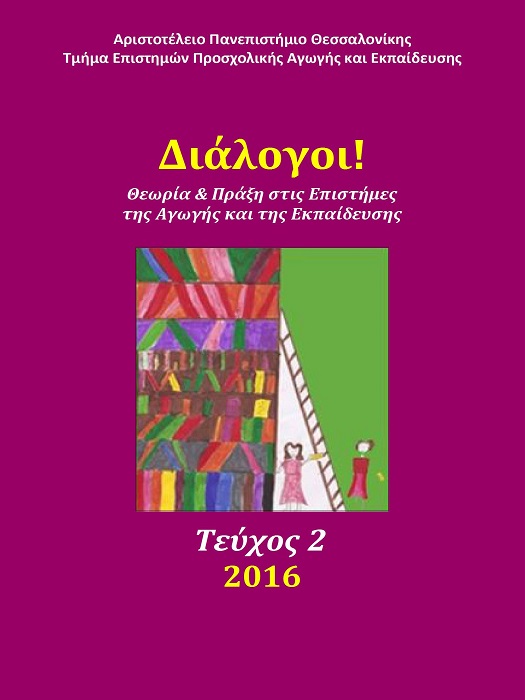Εκπαιδευτικοί και σύγχρονο παιχνίδι: Η περίπτωση των παιχνιδιών της μαζικής κουλτούρας

Περίληψη
Στην προσπάθειά τους να εντάξουν τα ενδιαφέροντα των παιδιών στο πρόγραμμα του νηπιαγωγείου οι εκπαιδευτικοί έρχονται αντιμέτωποι με μια ιδιαίτερη περίπτωση παιχνιδιών, τα παιχνίδια της μαζικής κουλτούρας. Η σχέση των συγκεκριμένων παιχνιδιών με τα μέσα μαζικής επικοινωνίας και ενημέρωσης και τη μαζική κουλτούρα προβληματίζει και ανησυχεί τους εκπαιδευτικούς σε σημείο που απαγορεύουν την είσοδό τους στην τάξη, παρά τον έκδηλο ενθουσιασμό των παιδιών. Προσεγγίζοντας την περίπτωση των αγαπημένων παιχνιδιών των παιδιών από την οπτική της κοινωνιο-πολιτισμικής θεωρίας, η παρούσα εργασία εξετάζει τα βασικά χαρακτηριστικά τους και παρουσιάζει επιχειρήματα υπέρ της ένταξής τους στο πρόγραμμα του νηπιαγωγείου. Επισημαίνονται ιδιαίτερα οι ευκαιρίες που παρουσιάζονται για την ανάπτυξη κριτικού βλέμματος απέναντι στα ΜΜΕ και τα προϊόντα της μαζικής κουλτούρας, η θετική επίδρασή τους στην ανάπτυξη του γραμματισμού, η σημασία και ο ρόλος τους για τις κοινωνικές σχέσεις των παιδιών και η συναισθηματική αξία τους για το παιδί της προσχολικής ηλικίας. Η εργασία τονίζει επίσης ότι, ως αντικείμενα που αντανακλούν τις τρέχουσες κοινωνικές, οικονομικές και τεχνολογικές αλλαγές, τα παιχνίδια της μαζικής κουλτούρας προσφέρονται για να εξετάσουμε τις αντιλήψεις μας για το σύγχρονο παιδικό παιχνίδι και την παιδική ηλικία.
Λεπτομέρειες άρθρου
- Πώς να δημιουργήσετε Αναφορές
-
Birbili, M. (2016). Εκπαιδευτικοί και σύγχρονο παιχνίδι: Η περίπτωση των παιχνιδιών της μαζικής κουλτούρας. Διάλογοι! Θεωρία και πράξη στις επιστήμες αγωγής και εκπαίδευσης, 2, 35–51. https://doi.org/10.12681/dial.10509
- Τεύχος
- Τόμ. 2 (2016)
- Ενότητα
- Ειδικό Θέμα

Αυτή η εργασία είναι αδειοδοτημένη υπό το CC Αναφορά Δημιουργού – Μη Εμπορική Χρήση – Παρόμοια Διανομή 4.0.
Οι συγγραφείς των άρθρων που δημοσιεύονται στο Διάλογοι! Θεωρία και Πράξη στις Επιστήμες Αγωγής και Εκπαίδευσης διατηρούν τα δικαιώματα πνευματικής ιδιοκτησίας επί των άρθρων τους, δίνοντας στο περιοδικό το δικαίωμα της πρώτης δημοσίευσης. Άρθρα που δημοσιεύονται στο Διάλογοι! Θεωρία και Πράξη στις Επιστήμες της Αγωγής και Εκπαίδευσης διατίθενται με άδεια Creative Commons 4.0 και σύμφωνα με την άδεια μπορούν να χρησιμοποιούνται ελεύθερα, με αναφορά στον/στη συγγραφέα και στην πρώτη δημοσίευση για μη κερδοσκοπικούς σκοπούς και με δικαίωμα τροποποίησης μόνον με παρόμοια διανομή (αν αναμείξετε, τροποποιήσετε, ή δημιουργήσετε πάνω στο υλικό, πρέπει να διανείμετε τις δικές σας συνεισφορές υπό την ίδια άδεια όπως και το πρωτότυπο).
To Τμήμα Επιστημών Προσχολικής Αγωγής και Εκπαίδευσης του Αριστοτέλειου Πανεπιστημίου Θεσσαλονίκης και το Εθνικό Κέντρο Τεκμηρίωσης διατηρούν το δικαίωμα να δημοσιεύουν, να αναπαραγάγουν, να παρουσιάζουν στο κοινό, να διανέμουν και να χρησιμοποιούν άρθρα που δημοσιεύονται στο Διάλογοι! Θεωρία και Πράξη στις Επιστήμες Αγωγής και Εκπαίδευσης σε οποιοδήποτε μέσο και μορφή είτε μεμονωμένα είτε ως μέρη συλλογικών έργων, για όλο το χρόνο διάρκειας προστασίας της πνευματικής ιδιοκτησίας και για όλες τις χώρες του κόσμου.
Αυτό περιλαμβάνει ενδεικτικά, και όχι αποκλειστικά, το δικαίωμα δημοσίευσης των άρθρων σε τεύχη του περιοδικού Διάλογοι! Θεωρία και Πράξη στις Επιστήμες Αγωγής και Εκπαίδευσης, αναπαραγωγής και διανομής μεμονωμένων αντιγράφων των άρθρων, αναπαραγωγής ολόκληρων των άρθρων σε άλλη έκδοση του Τμήματος Επιστημών Προσχολικής Αγωγής και Εκπαίδευσης του Αριστοτέλειου Πανεπιστημίου Θεσσαλονίκης και του Εθνικού Κέντρου Τεκμηρίωσης και αναπαραγωγής και διανομής των άρθρων ή περίληψης αυτών με χρήση πληροφορικού συστήματος αποθετηρίου.


